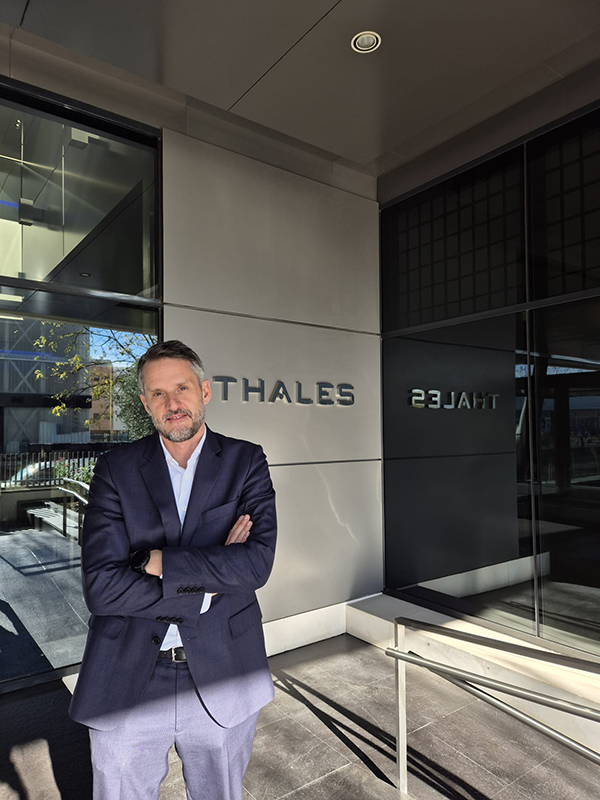You are joining Thales Spain at a time of changing cycle. How do you see the sector?
Defense is experiencing a very positive moment in terms of investment; we were coming from very different cycles compared to the one we are currently experiencing. Current conflicts such as the war in Ukraine, the conflict in the Middle East, as well as the various geopolitical tensions have reminded us that defense is a deterrent and that investment in defense is absolutely necessary to maintain our way of life in Europe.
You have worked both in the Spanish Armed Forces and in the private sector... This is an advantage...
The professional stages I have experienced previously help me better understand the different perspectives from the customer, both operational and technical, and the business perspective from the defense and aerospace industry. It's like a polyhedron that must be observed from different angles to visualize its complete geometric shape.
In any case, it is a complex sector by nature that always requires humility in its understanding and in which one is constantly learning.
Thales has gone through a period of change, the sale of transport, acquisitions in cybersecurity. What does the new Thales look like?
Thales committed to digitalization, digital security, and cybersecurity more than seven years ago. I think Thales was very visionary. Investing in digital technologies has allowed us to have a very balanced portfolio today. The commitment to dual technologies, investments in technologies like AI and quantum technologies are clear differentiators. Today, threats are hybrid, and in this sense, cybersecurity is key.
What is Thales's role at a time when there is so much talk about the national champion?
Thales is one of the leading European defense companies. It has a strong presence in Spain, collaborating for over 40 years on strategic projects such as tactical radio communications for the Army, command and control systems, satellite communications for SPAINSAT NG, border control systems for the Ministry of the Interior, among many others. Thales has more than 1,300 employees in Spain and has proven to be a trusted and reliable technology partner, helping to complement the national industry with cutting-edge technology for critical systems. Our history in Spain is a history of collaboration with local companies; SAES is a good example of this collaboration and technology transfer.
What can Thales contribute to the national industry?
The Thales Group invests nearly €4 billion each year in R&D and disruptive technologies. In my view, this is what Thales can contribute to Spain: differentiating cutting-edge technology supporting an industrial ecosystem that, in this new global geopolitical scenario, will require increasingly robust and seamless interconnected capabilities.
Traditionally, Thales has been closely linked to tactical communications; with its latest acquisitions, Thales has become one of the leading cybersecurity players worldwide.
As I mentioned before, Thales has been very visionary; for several years now, it has been committed to digital security and cybersecurity. Today, cyberspace is the new battlefield; threats are hybrid. It is worth noting that Thales applies cybersecurity from the initial design of all its products as a cross-cutting activity.
The Spanish Government recently announced an Industrial Security and Defense Plan with an investment of €10.487 billion. What can Thales contribute?
Thales is clearly committed to continuing to be a trusted technology partner in Spain, as it has demonstrated over the past forty years. A significant portion of the Security and Defense Industrial Plan is allocated to new secure radio communications, cybersecurity, and naval systems technologies. And that's where we can help a lot. Thales is a renowned technologist and has a very broad portfolio of solutions currently in operation in high-intensity scenarios that can be used to support our armed forces with new capabilities in a timely manner, within this new investment framework.
What role is AI playing in the defense field?
At Thales, we launched an AI accelerator seven years ago applied to critical systems. AI makes the operational difference in defense. At Thales, we understood that we cannot be end users, but must develop this technology ourselves. AI allows us to process and analyze large volumes of data in real time, helping us make key decisions more quickly, accurately, and reliably. Thus, our AI-based solutions allow us to accelerate threat identification and strengthen technological sovereignty. There are concrete examples of applications: air defense using GM200 radars, anti-submarine defense, air traffic control processing systems, image intelligence, radio communications, among others.
Being data-driven, AI can introduce risks, which is why it must be cybersecure from the outset and always be human-made. This is one of the pillars of our differentiating approach when we talk about AI targeting critical systems. I would like to highlight that Thales is a key player in the European technology ecosystem, advocating for trustworthy, transparent AI developed on ethical principles.

